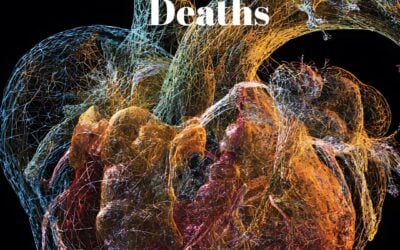JAKE F. FELICE, ND, LMP
Post-traumatic stress disorder (PTSD) develops as a cluster of symptoms in response to a traumatic event. The disorder appears to involve abnormal memory processing of the event, as well as impaired adaptation to changes in one’s environment.1
At some point in their lives, PTSD affects approximately 8% of Americans, contributing to health problems, substance abuse, depression, dissociation, and personality disorders.2 Patients can experience hyperarousal, numbing and avoidance, debilitating night terrors, insomnia, flashbacks, agitation, impaired concentration, changes in memory, excessive startle responses, and increased risk of suicide.2,3,4 Meanwhile, chronic stress from PTSD affects the hippocampus, amygdala, and prefrontal cortex, resulting in altered neurochemical signaling involved in the stress response.2
Cognitive therapy, venlafaxine, and sertraline are all options with supportive evidence of efficacy for PTSD.5 Unfortunately, dropout rates for cognitive therapy are high,6 and despite these interventions, a significant subset of patients remain treatment-resistant.7 This results in significant challenges for public health.
One reason conventional pharmacology fails is the noticeable lack of medications targeting alterations in traumatic memory processing.6 In PTSD treatment, this includes an inability of our current pharmacology to curtail learned responses to fear.6 It also includes its failure to suppress episodic retrieval of traumatic memories, and its lack of ability to mitigate the over-consolidation process that occurs immediately after re-experiencing trauma-related symptoms.6 These features of PTSD and the limits of the current pharmacopeia contribute to the lack of effectiveness of conventional antidepressant and anxiolytic drugs for PTSD. This creates an urgent need to develop and/or discover new and effective modalities that can more substantially diminish the multifaceted symptomatology of PTSD.
A Role for Cannabinoids in PTSD
Due to limitations of conventional therapy, many sufferers of PTSD are seeking out alternative means of therapy, including medical cannabis.8 PTSD patients show an increased prevalence of cannabis use,9 and research suggests that many PTSD patients are able to regulate their symptoms with cannabis, especially during sleep.10 A focus-group study of military veterans with PTSD identified dissatisfaction with conventional drugs for PTSD as a key reason for considering medical cannabis. The investigators reported that “Lack of therapeutic effect and/or experienced side effects with conventional medication played an important role in patients’ decisions to consider cannabis as a potential treatment alternative. Patients expressed a wish to reduce or stop the use of other [non–cannabis] medications, and some reported having done so. They reported minimal side effects of medical cannabis and strongly favored it over many of the other medications that they had used in terms of the ratio of therapeutic effects to side effects.”11
On the one hand, cannabinoids have the capacity to alleviate anxiety; on the other hand, they also influence aspects of trauma-based memories that contribute to PTSD. Since exposure-based memories are involved in PTSD, the potentiation of extinction learning (ie, learning to uncouple a stimulus from a traumatic emotional response), along with exposure-based psychotherapy, may be the most promising perspective in the application of cannabinoids to the treatment of PTSD.6
Human and animal studies now provide substantial evidence for a role of the endocannabinoid system (ECS) in controlling emotional states9 and the regulation of thought processes.12 Meanwhile, neuroanatomic studies demonstrate the presence of ECS signaling in brain structures involved in memory and learning, as well as in structures that play roles in fear responses and fear conditioning.12,13
The ECS is intimately involved in homeostasis, functioning as a self-regulating, harm-reduction system. It profoundly influences a multitude of physiologic processes in the human body and in almost all other mammals. The ECS consists of cannabinoid receptors CB1 and CB2, endogenous ligands known as endocannabinoids (including their transport mechanisms), and the endocannabinoid-metabolizing enzymes anandamide (AEA) and 2-arachidonoylglycerol (2-AG).
Along with helping to maintain homeostasis, the ECS regulates many neural functions related to trauma and trauma-based memories. Endocannabinoids exert an amnesic affect, which may play a role in the extinction of adverse memories. Cannabis may also help diminish the strength of traumatic memories by calming an overactive amygdala, thereby enabling patients to sleep better and to feel less anxiety during flashbacks.10 In a rat study, modulation of the ECS was shown to influence how emotions are stored in memory, suggesting that ECS-altering agents may be helpful complements to cognitive therapy for PTSD.3,14
The picture painted from currently existing literature indicates that hormonal, neurologic, and inflammatory disruptions observed in PTSD are all potentially modifiable by cannabinoids and ECS signaling. This article focuses mainly on neurologic aspects, including the formation, storage, and retrieval aspects of traumatic memories.
Targeting the Mechanisms
Endocannabinoids modulate the behavioral and psychological aspects of stress exposure, including neuroendocrine responses to stress.15,16 Acute, repetitive stress exposure reduces endocannabinoid levels in the amygdala, hippocampus, hypothalamus, and prefrontal cortex.15-17 Findings suggest that disruption of endocannabinoid signaling may disturb the cessation of stress responses and interfere with normal adaptive mechanisms to stress.15,16 Importantly, recent evidence demonstrates the role of the ECS and cannabinoids in the extinction of fear-based memories in PTSD.3 Rabinak et al state in their review article, “[P]reliminary data suggest that THC modulates threat-related processing in trauma-exposed individuals with PTSD, which may prove advantageous as a pharmacological approach to treating stress- and trauma-related psychopathology.”17
A number of psychiatric disorders, including PTSD, involve poor adaptation to environmental conditions as well as atypical memory processing at the CB1 receptor.18 A 2013 study suggests that abnormal AEA signaling, mediated by CB1 receptors, is involved in PTSD.13 This research provides scientists an evidenced-based model with which to approach this condition. Through modulation of memory processing, cannabinergic therapies may decrease the formation and entrenchment of traumatic memories.3
Preclinical studies demonstrate that disruption of the CB1 receptor prevents the extinction or letting go of traumatic memories, whereas the enhancement of CB1 appears to help this process.12 This raises the possibility that the ECS may be a good therapeutic target for disorders associated with inappropriate retention of memories, or inadequate adaptations to aversive environments as seen in PTSD and phobias.12 Further research is needed.
In an in-vivo positron emission tomography study, PTSD patients showed elevated levels of cannabinoid receptors.13 The study implicated abnormal endocannabinoid signaling at the CB1 receptor in PTSD. In another study, individuals with PTSD who survived the World Trade Center attacks showed significantly lower levels of endocannabinoids compared to controls who were near the attacks but who did not develop PTSD.19
In addition to their effects on fear and anxiety, a relatively large and growing amount of evidence is pointing to strong beneficial effects of cannabinoids on extinction processes of traumatic memories; this has been shown in mice to be mediated by CB1 receptors.20 Modulating cognitive processes that lead to the development as well as the persistence of PTSD symptoms could be of enormous help in improving the outcome of psychotherapy and the overall prognosis of PTSD patients.
Facilitating the extinction of trauma-learning enables patients to “let go” of painful memories. This is one of the most promising effects of cannabinoids in the treatment of PTSD.20 However, more evidence is clearly needed. The timely targeting of trauma-based memory processing holds promise for reducing PTSD symptoms while at the same time increasing the efficacy of exposure-based psychotherapy.20 Bitencourt et al state that these effects “make this compound a pharmacological adjunct to psychological therapies for PTSD” and that “CBD also shows an action profile with fewer side effects than the pharmacological therapy currently used to treat this type of disorder. In addition, even at high doses, CBD does not show the anxiogenic profile of compounds that directly activate [endocannabinoid] transmission.”20 If future research confirms the memory-modulating effects of cannabinoids in PTSD through improved extinction of memories or the ability of cannabinoids to attenuate retrieval of traumatic memories, it stands to reason that these features could help promote improved outcomes in individuals suffering with PTSD.
Animal studies suggest that timely administration of cannabinoids following trauma exposure prevents dysfunctional stress-related developments.9 Shortly after a traumatic experience, cannabinoid administration could reduce the impact of traumatic memory entrenchment by interfering with the consolidation and entrenchment process of potentially labile traumatic memories.6 Cannabinoids could also reduce traumatic memories by affecting the memory retrieval process, thus preventing reactivation of labile memories.6 Lastly, cannabinoids could enhance extinction learning, where a previously threatening memory can be integrated and decoupled from anxiety triggers, thereby becoming less threatening to experience.6
A recent study of over 400 cannabis users with PTSD indicated that the ECS represents a promising target in the treatment of PTSD symptoms.21 Patients experienced statistically significant reductions in the following symptoms: reduced irritability (67%), decreases in recurring thoughts (61%), reduced anxiety (57%), and reduced flashbacks (51%).21 Inhaled cannabis reduced acute symptoms by 50%. Higher doses of cannabis had greater anti-anxiety effects; however, the doses used to address anxiety increased over the course of the trial were associated with the development of tolerance, indicating potential complications for long-term use. The authors surmised that “some combination of THC, CBD, and perhaps some of the many other parts of the plant create the therapeutic effect.”21
PTSD & Sleep Disorders
Sleep-related symptoms are a common reason for individuals with PTSD to seek cannabis. Decreased nightmares and improved sleep quality are frequently reported in PTSD patients using cannabis.6 A recent systemic review examining cannabis and PTSD concluded that, although further investigations should be conducted, cannabis can reduce PTSD-related insomnia and night terrors.22 Two small clinical studies noted reduced severity or cessation of night terrors in individuals with PTSD after using THC, as well as decreased associations between PTSD, suicide, and severe depression.23
In an open-label clinical trial evaluating nabilone, a synthetic THC, over 70% of patients reported a total cessation or decrease in night terrors.24 However, a small number of patients experienced a return of nightmares upon withdrawal from the THC. These patients’ nightmares were controlled once the treatment was re-initiated. Other self-reported benefits for participants in this study included fewer daytime flashbacks, the cessation of nightsweats, and improvements in sleep time.24 No tolerance occurred during this trial.
A retrospective chart review of synthetic THC, examining its effects on PTSD insomnia and night terrors, revealed a decrease in night terrors, an increase in the number of hours slept, a decrease in overall PTSD symptoms, and a significant increase in global functioning.25 The authors stated, “It is particularly noteworthy that in virtually all subjects, nabilone was targeting a number of symptoms simultaneously, which may have helped to limit the risks associated with polypharmacy.”25
Another study, which compared CAPS (Clinician Administered Posttraumatic Scale) scores before and after treatment, showed statistically significant reductions in symptom severity for all of the symptom clusters examined.26 At the end of treatment, 44% of those receiving THC reported no distressing dreams, as compared to 0% of controls.26
Evidence indicates that many military veterans with PTSD use cannabis to help them cope and to control symptoms of anxiety and insomnia.27 One study linked diminished mental health to cannabis use in veterans with PTSD, although this study did not determine whether patients with more severe PTSD symptoms might be drawn to cannabis because of their more severe symptoms.28 Another, more recent study found that PTSD in non-cannabis-using controls was strongly linked to major depressive disorder and suicidal ideation, whereas PTSD in cannabis users was not associated with either suicidal ideation or major depressive disorder.23 Some symptoms common to PTSD, such as insomnia, nightmares, and anxiety, might be helped by cannabinoids, while others associated with complex PTSD, such as substance abuse and dissociation, might be aggravated.29 Cross-sectional studies point to a correlation between more severe PTSD and a heightened motivation in these patients to use cannabis for emotional regulation and stress-tolerance coping purposes.27
Complicating this picture is a scenario where many patients are dissatisfied with the efficacy, toxicities, and side effects of conventional medications.11 Clinicians treating patients with complex PTSD should therefore carefully assess potential impacts of cannabinoid therapy, as well as motivations of patients on an individual basis.
Conclusion
The efficacy of cannabinoids in PTSD is based on far more than speculation from a few animal studies. The promising improvement of PTSD by cannabinoids via extinction learning could be highly relevant in the treatment of PTSD and other stress and trauma related disorders. Cannabinoid therapy may prove to be a useful adjunct for cognitive and exposure-based psychotherapy. Of course, it is clear that more study is needed. More and better data are warranted to better understand the quality of cannabinoid and ECS-based improvements and the methods by which they may be safely used.
Overcoming the ongoing research barriers at the federal level in the United States, due to the Schedule-1 status of cannabis as an illegal botanical, will facilitate easier study of its therapeutic effects. Again, more human data are needed, including studies with cannabis-naïve patients and studies with longer follow-up periods. Concomitant issues of PTSD-associated mental health disorders and impaired cognitive function must also be examined in the context of cannabinoid therapy for PTSD. Other studies are warranted that compare the effects of CBD-dominant preparations with THC-dominant ones, as well as other secondary plant compounds, including cannabis terpenes and flavonoids.
References:
- The OAD Clinic. Cannabinoid Treatment for PTSD. Available at: https://www.cannabinoidmedicines.co.uk/ptsd. Accessed April 29, 2021.
- Bremner JD. Traumatic stress: Effects on the brain. Dialogues Clin Neurosci. 2006;8(4):445-461.
- Felice F. The ECS, Cannabis, & Sleep. NDNR. 2021;17(3):1,6-7. Available at: https://ndnr.com/insomniasleep-medicine/the-ecs-cannabis-sleep/. Accessed April 26, 2021.
- PsychCentral. Understanding the Effects of Trauma: Post-traumatic Stress Disorder (PTSD). Last reviewed on May 17, 2016. Available at: https://psychcentral.com/lib/understanding-the-effects-of-trauma-post-traumatic-stress-disorder-ptsd#1. Accessed April 29, 2021.
- Shalev A, Liberzon I, Marmar C. Post-Traumatic Stress Disorder. New Engl J Med. 2017;376(25):2459-2469.
- Berardi A, Schelling G, Campolongo P. The endocannabinoid system and Post Traumatic Stress Disorder (PTSD): From preclinical findings to innovative therapeutic approaches in clinical settings. Pharmacol Res. 2016;111:668-678.
- Shalev AY, Ankri Y, Gilad M, et al. Long-Term outcome of early interventions to prevent posttraumatic stress disorder. J Clin Psychiatry. 2016;77(5):e580-e587.
- Bonn-Miller MO, Boden MT, Bucossi MM, Babson KA. Self-reported cannabis use characteristics, patterns and helpfulness among medical cannabis users. Am J Drug Alcohol Abuse. 2014;40(1):23-30.
- Zer-Aviv TM, Segev A, Akirav I. Cannabinoids and post-traumatic stress disorder: Clinical and preclinical evidence for treatment and prevention. Behav Pharmacol. 2016;27(7):561-569.
- Barnes MP. The case for medical cannabis—an essay by M P Barnes. BMJ. 2018;362:k3230.
- Krediet E, Janssen DG, Heerdink ER, et al. Experiences with medical cannabis in the treatment of veterans with PTSD: Results from a focus group discussion. Eur Neuropsychopharmacol. 2020;36:244-254.
- Health Canada. Information for Health Care Professionals: Cannabis (marihuana, marijuana) and the cannabinoids. October 2018. Available at: https://tinyurl.com/h5tpbunn. Accessed April 26, 2021.
- Neumeister A, Normandin MD, Pietrzak RH, et al. Elevated brain cannabinoid CB 1 receptor availability in post-traumatic stress disorder: A positron emission tomography study. Mol Psychiatry. 2013;18(9):1034-1040.
- Chhatwal JP, Davis M, Maguschak KA, Ressler KJ. Enhancing cannabinoid neurotransmission augments the extinction of conditioned fear. Neuropsychopharmacology. 2005;30(3):516-524.
- Hill MN, Campolongo P, Yehuda R, Patel S. Integrating Endocannabinoid Signaling and Cannabinoids into the Biology and Treatment of Posttraumatic Stress Disorder. Neuropsychopharmacology. 2018;43(1):80-102.
- Felice JF. The ECS-Adrenal-Stress Axis. NDNR. 2021;17(2):21. Available at: https://ndnr.com/neurology/the-ecs-adrenal-stress-axis/. Accessed April 26, 2021.
- Rabinak CA, Blanchette A, Zabik NL, et al. Cannabinoid modulation of corticolimbic activation to threat in trauma-exposed adults: a preliminary study. Psychopharmacology. 2020;237(6):1813-1826.
- Lutz B. The endocannabinoid system and extinction learning. Mol Neurobiol. 2007;36(1):92-101.
- Gorzalka BB, Hill MN, Hillard CJ. Regulation of endocannabinoid signaling by stress: Implications for stress-related affective disorders. Neurosci Biobehav Rev. 2008;32(6):1152-1160.
- Bitencourt RM, Takahashi RN. Cannabidiol as a therapeutic alternative for post-traumatic stress disorder: From bench research to confirmation in human trials. Front Neurosci. 2018;12:502.
- LaFrance EM, Glodosky NC, Bonn-Miller M, Cuttler C. Short and Long-Term Effects of Cannabis on Symptoms of Post-Traumatic Stress Disorder. J Affect Disord. 2020;274:298-304.
- Hindocha C, Cousijn J, Rall M, Bloomfield MAP. The Effectiveness of Cannabinoids in the Treatment of Posttraumatic Stress Disorder (PTSD): A Systematic Review. J Dual Diagn. 2020;16(1):120-139.
- Lake S, Kerr T, Buxton J, et al. Does cannabis use modify the effect of post-traumatic stress disorder on severe depression and suicidal ideation? Evidence from a population-based cross-sectional study of Canadians. J Psychopharmacol. 2020;34(2):181-188.
- Fraser GA. The use of a synthetic cannabinoid in the management of treatment-resistant nightmares in posttraumatic stress disorder (PTSD). CNS Neurosci Ther. 2009;15(1):84-88.
- Cameron C, Watson D, Robinson J. Use of a synthetic cannabinoid in a correctional population for posttraumatic stress disorder-related insomnia and nightmares, chronic pain, harm reduction, and other indications: A retrospective evaluation. J Clin Psychopharmacol. 2014;34(5):559-564.
- Greer GR, Grob CS, Halberstadt AL. PTSD Symptom Reports of Patients Evaluated for the New Mexico Medical Cannabis Program. J Psychoactive Drugs. 2014;46(1):73-77.
- Betthauser K, Pilz J, Vollmer LE. Use and effects of cannabinoids in military veterans with posttraumatic stress disorder. Am J Health Syst Pharm. 2015;72(15):1279-1284.
- Gentes EL, Schry AR, Hicks TA, et al. Prevalence and correlates of cannabis use in an outpatient VA posttraumatic stress disorder clinic. Psychol Addict Behav. 2016;30(3):415-421.
- Dagan Y, Yager J. Cannabis and complex posttraumatic stress disorder a narrative review with considerations of benefits and harms. J Nerv Ment Dis. 2020;208(8):619-627.

Jake F. Felice, ND, LMP is a cannabis author, clinician, educator, and consultant whose vision is to advance the science and practical application of cannabis for medical and recreational markets around the world. Dr Felice provides world-class educational experiences by speaking authentically about hemp and cannabis. He consults with healthcare providers, industry, and the general public. His Category 1 CME courses for doctors, nurses, and pharmacists has been translated into 4 languages. Dr Felice is the founder of Cannabis Matrix Consulting, LLC, and he maintains a regular cannabis blog at drjakefelice.com.



















